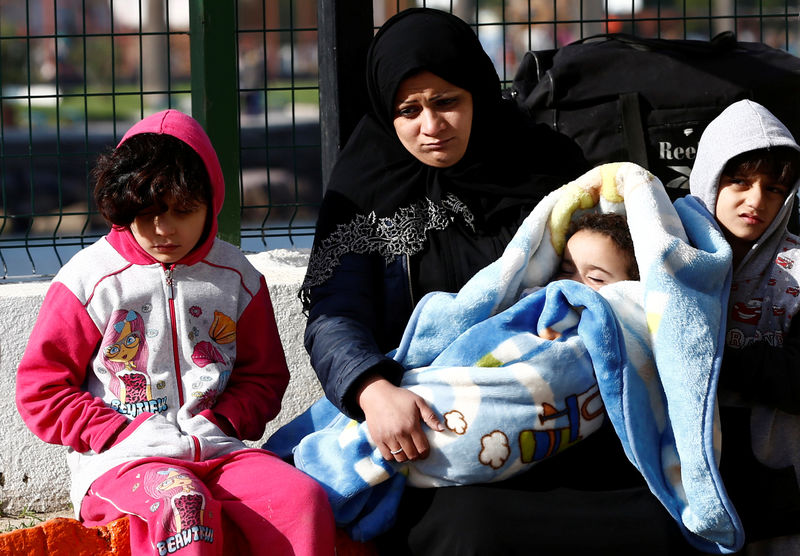By Paul Taylor
BRUSSELS (Reuters) - Despite deep public misgivings in some countries, the European Union will this week drive forward a plan to grant Turks visa-free travel to Europe as a reward for having reduced a flood of refugees and migrants into Europe to a trickle.
The European Commission is set to declare on Wednesday that Turkey has broadly met the criteria for early visa liberalization in a blaze of last-minute legislation and ask EU governments and the European Parliament to approve the decision by the end of June, several EU sources said.
"We have not lowered our standards. Turkey has raised its game," a senior EU official familiar with the negotiations said.
He was seeking to explain how the EU executive could certify compliance after telling lawmakers just two weeks ago that Ankara had met fewer than half the so-called benchmarks.
The political reality is that Brussels cannot say "No" and risk a collapse of a much criticized March 18 EU-Turkey deal that was a turning point in Europe's migration crisis.
It may lack political support to sustain a "Yes", but the Turkish government won't take "Later" for an answer.
So in the time-honoured EU manner, the Commission will present a package aimed at offering something for everyone.
AEGEAN ROUTE SHUT
Determined action by Turkey, in concert with Greece and NATO, and the closing of borders across the Balkans, has all but shut the main Aegean route for people fleeing war and poverty in Syria and elsewhere in the Middle East and Asia.
Figures delivered daily at 6 a.m. to European Commission President Jean-Claude Juncker show new arrivals on the Greek islands were down to 63 last Thursday from an average 10,000 a day at the peak last October.
Turkish Prime Minister Ahmet Davutoglu has warned that Ankara would stop implementing its side of the bargain to take back all those who reach Greece from its shores if Europe does not deliver on what he calls its commitment.
EU officials insist the union made no promise, and the offer applies only if Turkey meets 72 legal and technical conditions. The Commission reported this month that Ukraine and Georgia had met those benchmarks, and will add Kosovo on Wednesday.
Turkey is the most sensitive because it has the biggest population with 79 million and due to its flawed record on civil and minority rights, freedom of expression and the rule of law. Turkish officials warn against any anti-Muslim discrimination.
"This is a great opportunity for Europe to show it is a reliable partner and make it clear that they don't apply double standards when it comes to predominantly Muslim European nations such as Turkey," a government official in Ankara said.
"NO DISCOUNT"
Sceptics in the European Parliament and key member states such as France, Germany and the Netherlands, where there is substantial public opposition to opening borders to more Turks, insist they will examine Turkey's compliance with a microscope.
"There will be no refugee discount," said Manfred Weber, leader of the center-right group in the European Parliament from German Chancellor Angela Merkel's Bavarian sister-party.
"We'll look cool-headedly in parliament at whether Turkey has fulfilled the conditions for visa liberalization."
Officials and diplomats say there is huge pressure to push visa liberalization through, notably from Germany, which was the main destination for about a million refugees and migrants who entered the EU last year and would be among the first to suffer if the accord with Turkey broke down.
Among the trickiest conditions is non-discriminatory access to Turkey for citizens of all EU member states, which includes Cyprus, which Ankara does not officially recognize.
A senior EU diplomat belittled any suspense around the conditions, saying: "This is just a joke. We have already made the decision."
To make acceptance more politically palatable, Germany and France this week proposed tougher safeguards to allow any EU state to suspend visa-free travel from any country for six months in case of a sudden increase in asylum requests, overstays or readmission refusals.
Turkish EU ambassador Selim Yenel told Reuters his country could live with that provided Turkey was not singled out.
"Apparently, the Franco-German proposal aims at appeasing the possible fears of some EU nations and perhaps make it easier to win the support of some members states," Yenel said.
"We are not worried about these proposals but believe that the current safeguards are sufficient already."
Weber said parliament too would demand a tougher emergency brake as part of the package, as well as longer-term proposals to reform the EU's broken asylum system, known as the Dublin rules, which put the onus on the country of first arrival.
Those reforms are anathema to several states, including Poland, Hungary, Slovakia and the Czech Republic, which reject any permanent mechanism to share out refugees among EU states.
EU officials and diplomats believe no member state will ultimately halt visa freedom for Turkey, recalling that all 28 EU leaders signed up to the agreement with Ankara in March.
They are a bit less sure about the European Parliament, which can be a law unto itself.

Turkey has not made the decision easier by prosecuting critical journalists at home, arresting or barring some foreign reporters, and demanding that Germany prosecute a television satirist for insulting President Tayyip Erdogan.